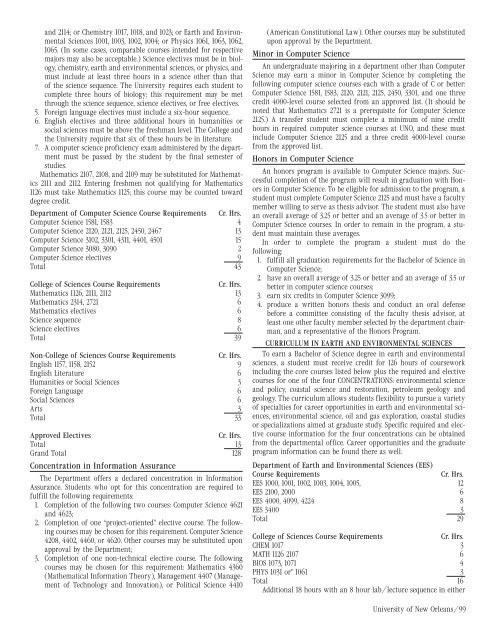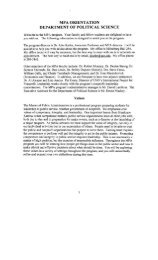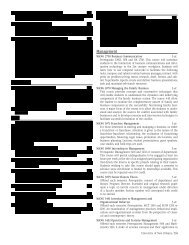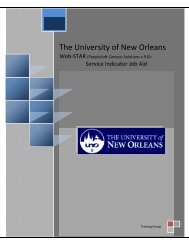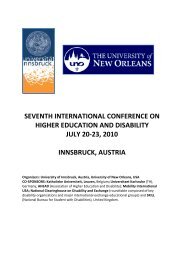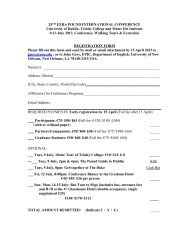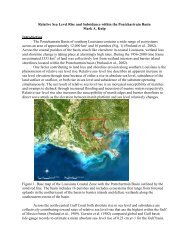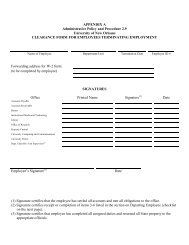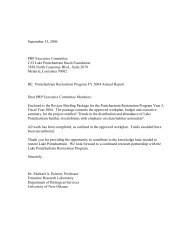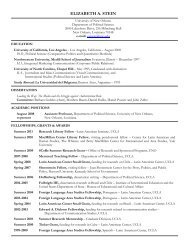Untitled - University of New Orleans
Untitled - University of New Orleans
Untitled - University of New Orleans
Create successful ePaper yourself
Turn your PDF publications into a flip-book with our unique Google optimized e-Paper software.
and 2114; or Chemistry 1017, 1018, and 1023; or Earth and Environmental<br />
Sciences 1001, 1003, 1002, 1004; or Physics 1061, 1063, 1062,<br />
1065. (In some cases, comparable courses intended for respective<br />
majors may also be acceptable.) Science electives must be in biology,<br />
chemistry, earth and environmental sciences, or physics, and<br />
must include at least three hours in a science other than that<br />
<strong>of</strong> the science sequence. The <strong>University</strong> requires each student to<br />
complete three hours <strong>of</strong> biology; this requirement may be met<br />
through the science sequence, science electives, or free electives.<br />
5. Foreign language electives must include a six-hour sequence.<br />
6. English electives and three additional hours in humanities or<br />
social sciences must be above the freshman level. The College and<br />
the <strong>University</strong> require that six <strong>of</strong> these hours be in literature.<br />
7. A computer science pr<strong>of</strong>iciency exam administered by the department<br />
must be passed by the student by the final semester <strong>of</strong><br />
studies.<br />
Mathematics 2107, 2108, and 2109 may be substituted for Mathematics<br />
2111 and 2112. Entering freshmen not qualifying for Mathematics<br />
1126 must take Mathematics 1125; this course may be counted toward<br />
degree credit.<br />
Department <strong>of</strong> Computer Science Course Requirements Cr. Hrs.<br />
Computer Science 1581, 1583 4<br />
Computer Science 2120, 2121, 2125, 2450, 2467 13<br />
Computer Science 3102, 3301, 4311, 4401, 4501 15<br />
Computer Science 3080, 3090 2<br />
Computer Science electives 9<br />
Total 43<br />
College <strong>of</strong> Sciences Course Requirements<br />
Cr. Hrs.<br />
Mathematics 1126, 2111, 2112 13<br />
Mathematics 2314, 2721 6<br />
Mathematics electives 6<br />
Science sequence 8<br />
Science electives 6<br />
Total 39<br />
Non-College <strong>of</strong> Sciences Course Requirements<br />
Cr. Hrs.<br />
English 1157, 1158, 2152 9<br />
English Literature 6<br />
Humanities or Social Sciences 3<br />
Foreign Language 6<br />
Social Sciences 6<br />
Arts 3<br />
Total 33<br />
Approved Electives<br />
Cr. Hrs.<br />
Total 13<br />
Grand Total 128<br />
Concentration in Information Assurance<br />
The Department <strong>of</strong>fers a declared concentration in Information<br />
Assurance. Students who opt for this concentration are required to<br />
fulfill the following requirements:<br />
1. Completion <strong>of</strong> the following two courses: Computer Science 4621<br />
and 4623;<br />
2. Completion <strong>of</strong> one “project-oriented” elective course. The following<br />
courses may be chosen for this requirement. Computer Science<br />
4208, 4402, 4460, or 4620. Other courses may be substituted upon<br />
approval by the Department;<br />
3. Completion <strong>of</strong> one non-technical elective course. The following<br />
courses may be chosen for this requirement: Mathematics 4360<br />
(Mathematical Information Theory), Management 4407 (Management<br />
<strong>of</strong> Technology and Innovation), or Political Science 4410<br />
(American Constitutional Law). Other courses may be substituted<br />
upon approval by the Department.<br />
Minor in Computer Science<br />
An undergraduate majoring in a department other than Computer<br />
Science may earn a minor in Computer Science by completing the<br />
following computer science courses each with a grade <strong>of</strong> C or better:<br />
Computer Science 1581, 1583, 2120, 2121, 2125, 2450, 3301, and one three<br />
credit 4000-level course selected from an approved list. (It should be<br />
noted that Mathematics 2721 is a prerequisite for Computer Science<br />
2125.) A transfer student must complete a minimum <strong>of</strong> nine credit<br />
hours in required computer science courses at UNO, and these must<br />
include Computer Science 2125 and a three credit 4000-level course<br />
from the approved list.<br />
Honors in Computer Science<br />
An honors program is available to Computer Science majors. Successful<br />
completion <strong>of</strong> the program will result in graduation with Honors<br />
in Computer Science. To be eligible for admission to the program, a<br />
student must complete Computer Science 2125 and must have a faculty<br />
member willing to serve as thesis advisor. The student must also have<br />
an overall average <strong>of</strong> 3.25 or better and an average <strong>of</strong> 3.5 or better in<br />
Computer Science courses. In order to remain in the program, a student<br />
must maintain these averages.<br />
In order to complete the program a student must do the<br />
following:<br />
1. fulfill all graduation requirements for the Bachelor <strong>of</strong> Science in<br />
Computer Science;<br />
2. have an overall average <strong>of</strong> 3.25 or better and an average <strong>of</strong> 3.5 or<br />
better in computer science courses;<br />
3. earn six credits in Computer Science 3099;<br />
4. produce a written honors thesis and conduct an oral defense<br />
before a committee consisting <strong>of</strong> the faculty thesis advisor, at<br />
least one other faculty member selected by the department chairman,<br />
and a representative <strong>of</strong> the Honors Program.<br />
CURRICULUM IN EARTH AND ENVIRONMENTAL SCIENCES<br />
To earn a Bachelor <strong>of</strong> Science degree in earth and environmental<br />
sciences, a student must receive credit for 126 hours <strong>of</strong> coursework<br />
including the core courses listed below plus the required and elective<br />
courses for one <strong>of</strong> the four CONCENTRATIONS: environmental science<br />
and policy, coastal science and restoration, petroleum geology and<br />
geology. The curriculum allows students flexibility to pursue a variety<br />
<strong>of</strong> specialties for career opportunities in earth and environmental sciences,<br />
environmental science, oil and gas exploration, coastal studies<br />
or specializations aimed at graduate study. Specific required and elective<br />
course information for the four concentrations can be obtained<br />
from the departmental <strong>of</strong>fice. Career opportunities and the graduate<br />
program information can be found there as well.<br />
Department <strong>of</strong> Earth and Environmental Sciences (EES)<br />
Course Requirements<br />
Cr. Hrs.<br />
EES 1000, 1001, 1002, 1003, 1004, 1005, 12<br />
EES 2100, 2000 6<br />
EES 4000, 4099, 4224 8<br />
EES 3400 3<br />
Total 29<br />
College <strong>of</strong> Sciences Course Requirements<br />
Cr. Hrs.<br />
CHEM 1017 3<br />
MATH 1126 2107 6<br />
BIOS 1073, 1071 4<br />
PHYS 1031 or* 1061 3<br />
Total 16<br />
Additional 18 hours with an 8 hour lab/lecture sequence in either<br />
<strong>University</strong> <strong>of</strong> <strong>New</strong> <strong>Orleans</strong>/99


